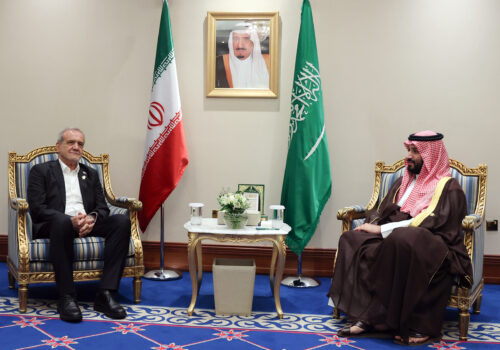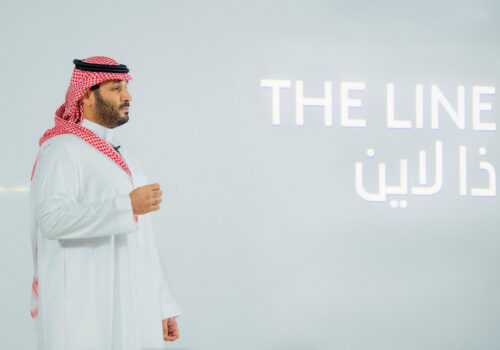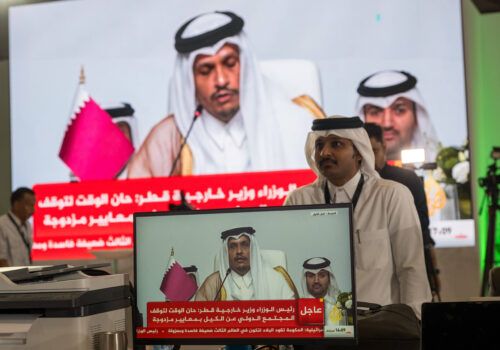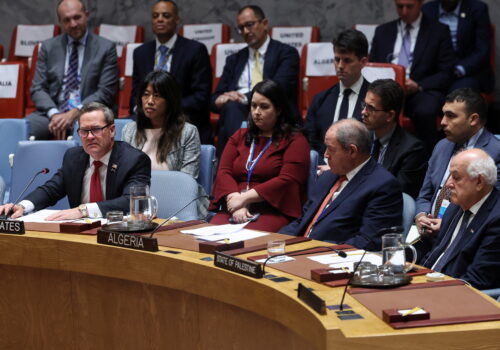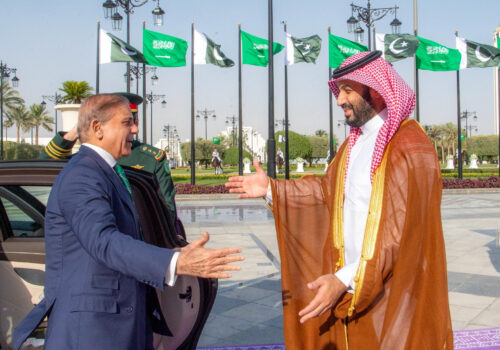Peace, pacts, and recognition: Saudi Arabia at the forefront of a new Middle East
Ever since the historic signing of the 2020 Abraham Accords, the prospect of a normalization agreement between Saudi Arabia and Israel has entailed high hopes and great expectations. With last month’s cease-fire agreement between Israel and Hamas as part of the US-led peace plan for Gaza, there is a renewed possibility of a Saudi-Israeli normalization—and with it, the potential of a two-state solution for Israel and the Palestinians.
Soon after phase one of the cease-fire deal was announced, the Saudi Foreign Ministry issued a supportive statement, saying that US President Donald Trump’s comprehensive plan “seeks to pave the way for a comprehensive and just peace.” A regionally supported reconciliation and reconstruction of Gaza could enable a Red Sea rapprochement and mark the opening of a new chapter: one that recognizes the mutual benefits of cooperation while honestly confronting the grievances that have fueled conflict. It could realize the long-sought normalization with Israel—not as an eventual endpoint, but as a platform for shared prosperity and security in which Gaza’s reconstruction becomes the measure of regional seriousness. If mismanaged, there is the danger of a diplomatic mirage—all optics and little substance—that leaves residents of Gaza more disillusioned and regional tensions exposing heightened levels of risk to shared US and Saudi interests.
Now, with Saudi Crown Prince Mohammed bin Salman’s—or MBS’s—first official visit to Washington since 2018, Trump and other US officials remain eager to add Saudi Arabia to the Abraham Accords rota and to strike a defense pact. Regardless of whether a normalization deal proves achievable during this visit, officials in Washington and Riyadh still have the opportunity to enhance defense cooperation to address shared security interests.
Related reading
In a Washington-Riyadh bilateral defense pact, Saudi armed forces would benefit from continuous technical advice and support from the US military, and the United States would enjoy greater access to Saudi territory and airspace. Further, as a foundation to increase security cooperation, the defense elements of Saudi Arabia’s Vision 2030 plan aim for the kingdom to spend 50 percent of its military budget domestically, and there is a mandate that foreign defense firms establish partnerships with local Saudi firms or open local offices inside the kingdom. Since 2018, US firms have increasingly taken note and sought to support localization and co-production.
From the US perspective, the door for Israeli-Saudi normalization has been wide open since the 2020 Abraham Accords, penned under Trump’s first administration— and followed up into the Biden administration and Trump’s second term. Before the horrific October 7, 2023, Hamas attacks on Israel that launched the war in Gaza, Saudi Arabia had been working toward a significant deal with the United States to normalize ties with Israel, in return for a US defense cooperation agreement and cooperation on the development of a civil nuclear program.
Even before the war in Gaza, it was generally recognized that in order to formalize bilateral relations between Riyadh and Jerusalem, Washington could not ignore the Saudis’ steady advocacy for a two-state solution, with the Palestinians achieving a formally recognized statehood.
During the US-Saudi Strategic Dialogue in the autumn of 2020, then US Secretary of State Mike Pompeo urged his counterpart, Saudi Foreign Minister Prince Faisal bin Farhan al Saud, toward recognition of Israel, stating, “we hope Saudi Arabia will consider normalizing its relationships as well, and we want to thank them for the assistance they’ve had in the success of the Abraham Accords so far.”
Since the war in Gaza began, MBS and other senior Saudi officials, have re-emphasized the commitment to the two state solution. That includes Saudi Ambassador to the United States Princess Reema bint Bandar, who observed that the “two-state solution is the only framework that can end the bloodshed, rebuild Gaza, and create a sustainable future.” She also emphasized that any Saudi normalization with Israel would only occur with credible, irreversible efforts towards Palestinian statehood.
On the margins of the 2024 UN General Assembly, the kingdom formed a global alliance to push for a two-state solution, and this summer, the Saudi foreign minister affirmed the kingdom’s efforts “to advance the implementation of relevant UN resolutions calling for the establishment of two states.”
Israeli Prime Minister Benjamin Netanyahu has historically rejected the idea of a Palestinian state. After last month’s cease-fire deal, he noted that “Palestinians should have all the powers in a peaceful day to govern themselves, but they can’t have the powers to threaten our survival. That sovereign power of security must remain with Israel.”
Security concerns dominate Israeli thinking, and justifiably so. Any rapprochement that does not take seriously Israel’s legitimate security requirements will have little staying power. That reality need not be incompatible with robust reconstruction. In fact, a Gaza reconstruction program that improves living conditions and creates credible, locally accountable governance reduces the long-term security threats that feed cycles of violence.
Israel, its Arab partners, and wider international actors should therefore craft arrangements that couple reconstruction with security cooperation, aimed at preventing arms smuggling, extremist exploitation, and the reconstitution of militant capabilities—while ensuring that such measures do not subvert civilian oversight or the delivery of aid into Gaza.
If Palestinian statehood is achieved in the future, it will be incumbent upon neighboring states, particularly Saudi Arabia, to ensure the Palestinian state exists according to both law and practice. Any sort of two-state solution cannot allow for the development of a proto-state permissive to radicalization and terrorist facilitation to exist next to thriving neighboring countries. Understandably, Israel’s neighbors that are committed to border integrity and a shared interest in regional security, such as Egypt and Jordan, will expect other Arab states to recognize the requirement to de-radicalize Gaza and keep Hamas out. This is where the United States, via its Central Command, will have an essential regional security cooperation role as a trusted agent for information sharing and coordination.
This autumn, officials in Riyadh publicly signaled—and internally communicated—that Saudi Arabia will back multilateral efforts to disarm and marginalize Hamas and strengthen the role of the Palestinian Authority as part of a political settlement in Gaza. According to an internal Foreign Ministry report, the kingdom plans to “support the deployment of an international peacekeeping mission in Gaza,” and that it “aims to present the kingdom’s vision for enhancing stability in the Gaza Strip and the Palestinian territories.”
There are practical reasons why Saudi engagement matters. Riyadh offers economic heft with the $600 billion investment deal, diplomatic legitimacy in the Arab world with the Saudi-French push for the two-state solution, and a strategic relationship with the United States that can help underwrite security guarantees and reconstruction financing. Saudi buy-in could broaden the donor base, encourage private investment, and make sanctions relief or targeted incentives politically palatable in capitals that might otherwise be reticent.
The art of modern diplomacy is sometimes critiqued for the trading of ideals for expedience. The real test of statesmanship in this transitional moment is whether pragmatism can be married to principle: whether diplomatic openings for rapprochement can be structured so that political normalization pays dividends for Palestinians through concrete stability, reconstruction, and governance.
A rapprochement between Saudi Arabia and Israel that addresses Riyadh’s key defense requests and places Gaza’s reconstruction at its moral and practical center could turn a new alignment into something more than a strategic realignment—it could become a test of whether the Middle East can convert rapprochement and security cooperation into stabilization, reconstruction, and a rebuilt Gaza into viable regional reconciliation.
R. Clarke Cooper is a distinguished fellow with the Atlantic Council’s Scowcroft Middle East Security Initiative and is the founder and president of Guard Hill House, LLC. He previously served as assistant secretary for political-military affairs at the US Department of State.
Further reading
Thu, Sep 18, 2025
Are Arab nations going to impose real costs on Israel?
New Atlanticist By Gina Abercrombie-Winstanley
Arab and Islamic leaders recently met in Doha to discuss Israel’s strike against Hamas leaders in the Qatari capital. It might mark a turning point in regional diplomacy toward Israel.
Fri, Nov 7, 2025
The important change needed in UNSC’s Gaza resolution: Control over the money
MENASource By Thomas S. Warrick
Taking the money away from Hamas is the best nonmilitary way to ensure Hamas is unable to rebuild and rearm.
Fri, Sep 26, 2025
The Saudi-Pakistan defense pact highlights the Gulf’s evolving strategic calculus
MENASource By
In Riyadh’s multi-aligned policy, signing a mutual defense deal with Pakistan is complementary, not alternative, to US security guarantees.
Image: US President Donald Trump arrives in Riyadh, Saudi Arabia, on Tuesday May 13, 2025, and is greeted by Crown Prince Mohammed bin Salman, kicking off a four-day swing through the Gulf region. Photo by Saudi Press Agency handout via EYEPRESS and Reuters.
